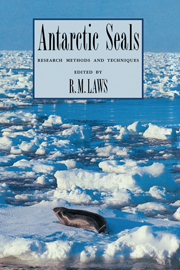Book contents
- Frontmatter
- Contents
- List of contributors
- Preface
- Introduction
- 1 Identification of species
- 2 Estimation of population sizes
- 3 Immobilization and capture
- 4 Marking techniques
- 5 Telemetry and electronic technology
- 6 Behaviour
- 7 Killing methods
- 8 Morphometrics, specimen collection and preservation
- 9 Genetic-based studies for stock separation
- 10 Collection of material for the determination of organochlorine and heavy metal levels
- 11 Age determination
- 12 Reproduction
- 13 Diet
- 14 Bioenergetics
- 15 Development of technology and research needs
- 16 Appendices
- Index
13 - Diet
Published online by Cambridge University Press: 05 February 2010
- Frontmatter
- Contents
- List of contributors
- Preface
- Introduction
- 1 Identification of species
- 2 Estimation of population sizes
- 3 Immobilization and capture
- 4 Marking techniques
- 5 Telemetry and electronic technology
- 6 Behaviour
- 7 Killing methods
- 8 Morphometrics, specimen collection and preservation
- 9 Genetic-based studies for stock separation
- 10 Collection of material for the determination of organochlorine and heavy metal levels
- 11 Age determination
- 12 Reproduction
- 13 Diet
- 14 Bioenergetics
- 15 Development of technology and research needs
- 16 Appendices
- Index
Summary
Introduction
Estimation of food consumption is usually approached by combining dietary data with information on metabolic energy requirements. Bioenergetic considerations are dealt with in chapter 14; here we consider the main methods for investigating seal diets. Knowledge of their diet is obviously fundamental to studies of the ecology of Antarctic seals and especially to any understanding of their role as predators in the Southern Ocean marine ecosystem. Unfortunately, while we have acceptable qualitative information on the diet of most species (well summarized by Øritsland, 1977), there is insufficient quantitative data to characterize adequately the diet of any species, even in summer. This chapter describes the best methods available at present for the collection, preservation and analysis (including species' identification) of various types of food sample. Suggestions are also provided for appropriate ways in which to present the results of such studies.
Nowadays, the first main objective of dietary studies of seals must be to determine the quantitative composition of the diet. There is no method for acquiring and analysing prey eaten by seals that is free from bias of one kind or another. Research to estimate the extent of these biases and to provide correction factors which may be applied to appropriate compositional data is therefore an important additional requirement.
Collection of food samples
There are three main sources of material suitable for studies of seal diets:
complete stomachs (and intestines) from killed seals;
partial samples of stomach contents obtained from live seals either by using emetics, stomach pumps or other stomach flushing techniques or by natural regurgitation;
collection of faecal droppings (scats).
- Type
- Chapter
- Information
- Antarctic SealsResearch Methods and Techniques, pp. 268 - 290Publisher: Cambridge University PressPrint publication year: 1993
- 12
- Cited by



